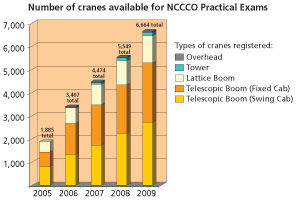January 2010 – Late last year the National Commission for the Certification of Crane Operators (NCCCO) registered its 2,000th CCO Practical Exam site. Befittingly, the site—at Hawaii Crane & Hoist, in Kula, HI—is located in one of the first states to adopt the CCO program, in 2003.
The 2,000-site milestone took only about half as long to achieve as it took NCCCO to register its first 1,000 Practical Exam sites in March 2006. Since that time, the total number of cranes approved for use on Practical Exams has also more than doubled to over 6,500 (see graph below).
“The accelerating pace at which these milestones have been achieved directly reflects the growth and acceptance of NCCCO programs across the entire country,” noted NCCCO Executive Director Graham Brent.

NCCCO’s Salt Lake City office develops and maintains CAD drawings for each of the 6,500+ cranes in its database, in itself a remarkable logistical feat. The 2,000 registered sites include 1,916 mobile crane sites, 87 tower crane sites, and 39 overhead crane sites, including some sites that have mobile, tower, and/or overhead cranes available at the same site. Practical Exam sites have been registered in all 50 states as well as the District of Columbia and Puerto Rico. California leads the way with 658 sites, including 21 tower crane sites.
The Practical Exam as a required component of CCO–operator certification was introduced in 2000 to demonstrate proficiency in satisfactorily completing an “operation test” as defined in the ASME B30.5 standard. NCCCO began registering sites and their machines in 1999 to provide standardized exam layouts based on established criteria so candidates would be assessed via a fair, valid, and reliable process.
“These 2,000 CCO Practical Exam sites represent an enormous effort on the part of construction companies, industry organizations, and training providers to provide access to the CCO Practical Exam”, reflected Phillip Kinser, NCCCO Manager of Program Development and Manager of the Salt Lake City office. “The registration of the 2,000th CCO Practical Exam site is a milestone that clearly indicates the overall acceptance of operator certification in general and of the CCO Practical Examination process in particular.”
Increasingly, crane operators are seeking certification to meet company and state requirements, as well as their individual career goals. National certification requirements are likely to be enacted under the C-DAC Proposed Federal Rule, which is expected to be published this year.